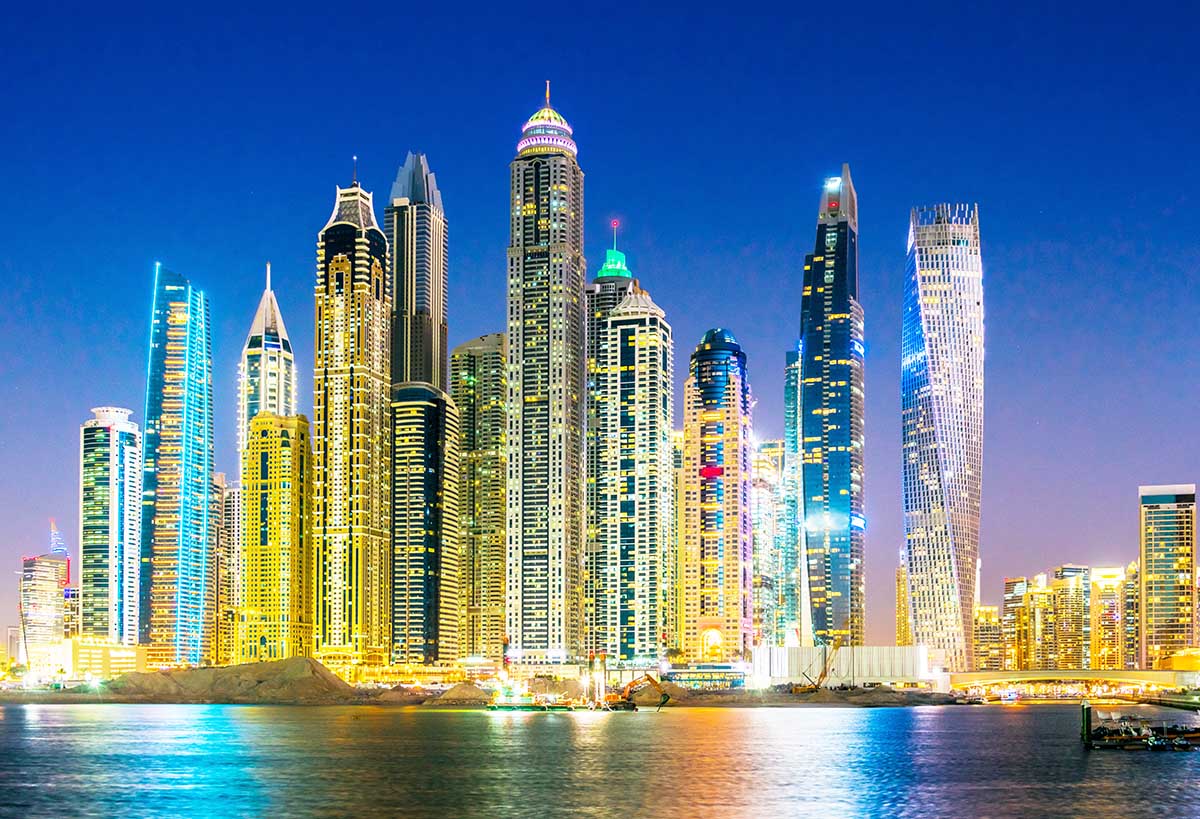Buying Property in Dubai as a foreigner.
If you live in the U.S. and you’re considering buying a home or an investment property in Dubai, you’re in good company with DRUS. Americans are drawn to Dubai’s real estate market because of its strong property rights, modern infrastructure, landlord-friendly rental laws, low taxes, and a U.S. dollar–pegged currency that removes much of the FX uncertainty. This guide walks you through everything that matters when buying property in Dubai as a foreigner, from ownership rules and fees to mortgages, visas, rental regulations, and exit planning. I’ll highlight the common pain points U.S. buyers and foreign buyers encounter and explain how to avoid them.
Based in Orange County, CA, our Dubai real estate agents help Americans like you invest and buy property in Dubai with confidence. We guide clients through the rules of freehold ownership, title registration, and tax considerations, while connecting investors with residential properties in prime areas, including Downtown Dubai, Palm Jumeirah, Jumeirah Village Circle, and Dubai Marina. With expertise in both the U.S and Dubai markets, DRUS ensures a smooth, legally secure buying process and offers insights on residency-linked investments, making us a trusted partner for Americans seeking global real estate opportunities.
If you’re ready to start your Dubai property buying journey, contact DRUS today. Let our team help you find and secure the perfect Dubai property. We will help you throughout the entire process, including closing and beyond.
What’s the Dubai property market like?
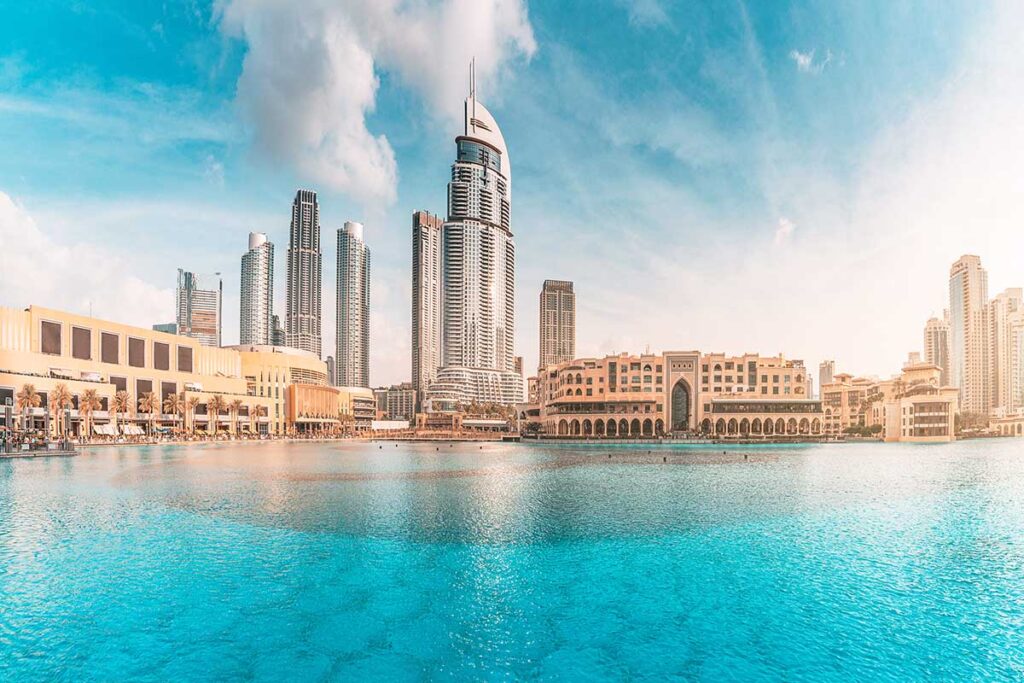
Dubai’s property market in 2025 is booming, making it attractive for foreign and American investors.
In the first half of the year, real estate deals reached AED 431 billion ($117B USD), a 25% increase from the same period last year, indicating strong and growing demand.
Developers like Emaar reported record profits and sales, signaling confidence in the market’s long-term growth.
Property values have more than doubled since 2020, and while analysts anticipate a slight correction due to new supply, this also presents more opportunities to buy at competitive prices.
Rentals remain high, keeping yields attractive compared to U.S. markets. With tax-free income, high ROI potential, and Dubai’s role as a global business hub, the city continues to be one of the most lucrative spots for international real estate investment.
Can Americans buy property in Dubai?
Yes, Americans can purchase property and real estate in designated freehold areas of Dubai, which permit foreigners to own property. In practice, Americans are allowed to buy a property in a freehold zone and register the title deed with the Dubai Land Department (DLD). After registration, your name is placed on the title deed, making you a 100% owner of the property. For off-plan purchases (under construction), registration happens on the interim register (Oqood) and funds are protected in regulated escrow accounts.
Key Takeaways:
- Americans and foreign investors can purchase and own an apartment, townhouse, villa, or piece of property outright in designated freehold zones, such as Dubai Marina, Downtown Dubai, Palm Jumeirah, Business Bay, Jumeirah Village Circle, Dubai Hills Estate, and Arabian Ranches.
- If you buy an off-plan property, your payments are held in a developer escrow account, regulated by Dubai law. The developer can only access the funds when they achieve specified construction milestones, thereby safeguarding your investment.
DRUS Note: Some U.S. buyers are concerned about the confusion between “leasehold property vs. freehold property.” In Dubai’s freehold areas, you’re buying the real thing: a perpetual (forever ownership), transferable title deed recorded at Dubai Land Department, making you the sole owner of the property in Dubai.
What are the legal requirements for Americans to buy property in Dubai?

Americans can legally buy property in Dubai with minimal hurdles. The main requirement is that Americans can only purchase properties in designated freehold areas, such as Downtown Dubai, Palm Jumeirah, or Dubai Marina, where foreigners are granted full ownership rights.
UAE residency is not required for Americans to buy Dubai property. All Americans need is a valid passport and to be 21 years or older.
Buyers must register with the Dubai Land Department to receive a title deed and cover standard costs, including a 4% transfer fee, registration fees, and 2–3% broker commission. Proof of funds or mortgage approval may be requested.
Ownership in freehold zones allows you to sell, lease, and pass the property on through inheritance. While property purchase doesn’t require a visa, investing AED 750,000+ ($204K USD) qualifies you for a 2-year residency visa, and AED 2M+ ($545K USD) unlocks a 10-year Golden Visa.
Overall, Dubai offers Americans straightforward, tax-free property ownership, along with the option to secure long-term residency through investment.
If you’re ready to explore your options, contact DRUS today. Let us guide you through every step of the Dubai property buying process.
How can Americans find properties in Dubai?
Americans looking to purchase property in Dubai can find suitable properties by reaching out to DRUS. We have exclusive partnerships with developers of luxury apartments, homes, and modern luxury villas throughout Dubai. We have access to exclusive listings that aren’t available online. If you’re looking for the perfect Dubai property, contact us today!
We understand that the process of buying a Dubai property can be overwhelming, but that’s precisely where DRUS makes the difference. We’ve partnered directly with leading Dubai real estate agents and top developers to bring Americans access to the best properties in Dubai’s most desirable areas. Whether you’re interested in ready-to-move-in apartments, off-plan villas, or stylish townhomes, our California-based real estate team helps you perform a property search, evaluate, and secure the right Dubai property that matches your goals.
We simplify the process by connecting you with trusted partners, ensuring transparency, and guiding you through every step of the purchase. Instead of navigating Dubai’s fast-moving property market alone, reach out to DRUS. We’ll not only help you find the perfect home or investment property but also make the entire experience stress-free and reliable so that you can feel confident in your Dubai real estate journey.
What are the best places for Americans to buy property in Dubai?
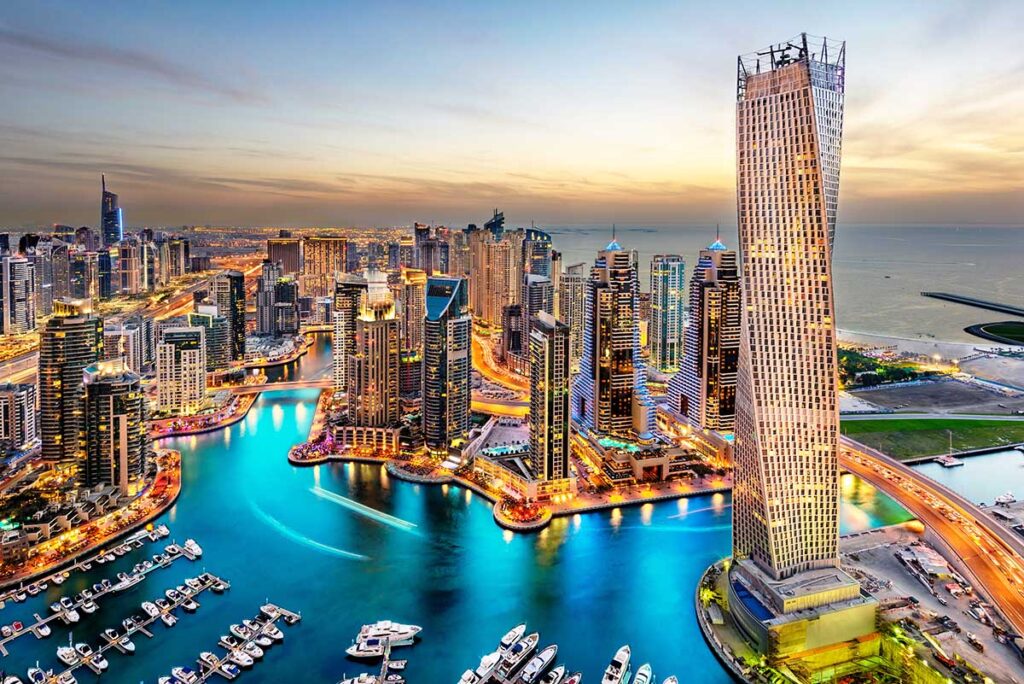
Here are some of the best places in Dubai for Americans to buy property. Foreign and American ownership is permitted in all these areas, allowing Americans to purchase property and hold it forever.
1. Dubai Marina
A standout choice for waterfront living and lifestyle appeal, Dubai Marina offers luxury high-rise apartments set against stunning views, making it perfect for Americans and investors seeking high rental income and prestige.
2. Jumeirah Village Circle (JVC)
JVC is a family-friendly, more affordable neighborhood in Dubai with solid rental yields.
3. Business Bay
Located near the city center, Business Bay blends commercial and residential spaces. It delivers strong rental yields and benefits from its closeness to Downtown Dubai.
4. Downtown Dubai
Home to icons like Burj Khalifa and Dubai Mall, Downtown Dubai remains a symbol of luxury living and long-term appreciation. It is highly sought-after, making it ideal for buyers and investors seeking both prestige and performance.
5. Dubai Hills Estate
A curated, upscale community featuring villas, apartments, a golf course, and premier amenities such as Dubai Hills Mall. Especially appealing to foreign nationals seeking quality, lifestyle, and solid infrastructure.
6. Jumeirah Lake Towers (JLT)
A dynamic mixed-use district built around scenic man-made lakes, offering convenient metro access and a balance between urban living and value.
7. Palm Jumeirah
One of Dubai’s most famous landmarks, Palm Jumeirah offers beachfront villas, luxury apartments, and hotel residences. It attracts global investors seeking exclusivity, prestige, and strong rental demand.
8. Arabian Ranches
A master-planned villa community, Arabian Ranches is perfect for families, offering peaceful suburban living with schools, parks, and golf courses while maintaining strong long-term property values.
9. Dubai Creek Harbour
A growing hotspot with iconic planned landmarks and waterfront apartments, Dubai Creek Harbour is an investment-friendly choice for those seeking long-term growth in a new urban hub.
How does Dubai’s legal and regulatory system protect American buyers?
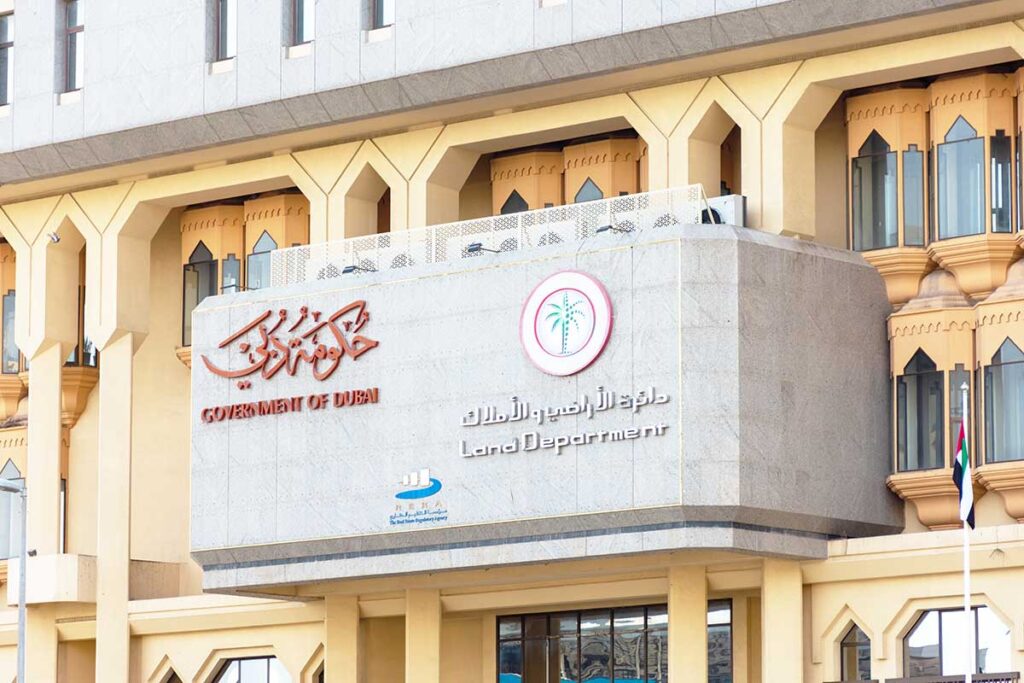
Key public bodies protecting American and foreign buyers of Dubai property:
- Dubai Land Department (DLD). The DLD deals with property titles, transfers, registrations, trustee centers, fees, and the Dubai REST app.
- Real Estate Regulatory Agency (RERA). A part of DLD that regulates brokers, developers, escrow, and rental rules (including the Rental Index).
Sale Agreement Contracts
Most resale deals use DLD’s Unified Contract F, which is the standard sale agreement generated in the DLD system. Brokers create it in Dubai REST/eMart, and both parties sign it before property transfer. You can even view an official bilingual sample.
Off-plan escrow protection:
Developers must open escrow accounts with approved trustees; buyers pay into the escrow account, not directly to the developer’s operating account. Law No. (8) of 2007 created this protection; DLD also explains who can manage those escrow accounts.
DRUS Note:
U.S. off-plan investors often worry about “What if the developer fails?”
Dubai’s escrow regime and project oversight significantly reduce that risk relative to many other global off-plan markets by placing your funds into a government escrow account until the developer reaches certain milestones. Still, verify a project’s status and the developer’s license through DLD before you commit to and purchase an off-plan property in Dubai.
Thinking about buying off-plan in Dubai? At DRUS, we specialize in helping Americans take advantage of Dubai’s off-plan opportunities, from flexible payment plans to high-growth communities. Explore our Off-Plan Property Buying Services to learn how we can connect you with top developers, secure escrow-protected deals, and guide you through every step with confidence.
Step-by-step Dubai property buying process.
- Set your budget and remember to include fees. (We’ll detail them in the next section.)
- Choose an area and property type. Consider factors such as choosing an apartment over a villa, a freehold community, proximity to a metro or airport, and a building that allows for short-term rentals.
- If financing, get a mortgage pre-approval.
- Work with a US-based real estate agent and confirm their license.
- Agree on terms and sign Unified Contract F (MOU). This purchase agreement/contract outlines key items, including price, timelines, deposit, and the obligations of each party.
- If the seller has a mortgage, the buyer or the buyer’s bank settles it; the developer then issues a No-Objection Certificate (NOC) after confirming that there are no dues.
- Transfer Money. You make a payment on the property, pay the DLD fees, and receive the title deed (either digital or printed).
- Post-transfer admin. Connect utilities via DEWA, district cooling (if applicable), and register co-occupants.
Timeline reality check: Mortgage deals usually take longer due to valuation and bank processing. Cash deals can close fast once the NOC is ready and the trustee office slots are available.
Buying Property in Dubai: fees and costs.
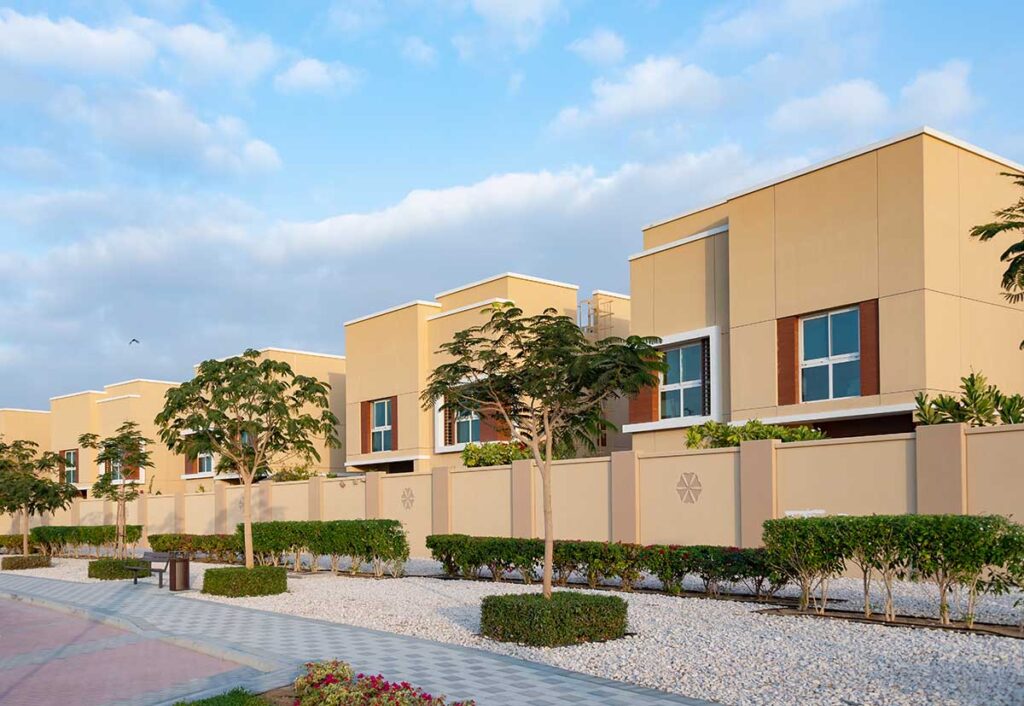
Dubai’s headline is “low taxes,” but you should keep in mind that several one-time government and service fees apply at purchase, and some recurring costs apply after. So, if you’re thinking about buying property or real estate in Dubai, keep in mind the following one-time fees:
- DLD Transfer Fee: The Dubai Land Department charges a transfer fee of 4% of the purchase price. The buyer commonly pays this fee, but sometimes the buyer negotiates so that the seller pays the fee.
- DLD Admin / Title Deed / Registration: There is also a fixed admin and registration fee (e.g., AED 580 title deed admin; AED 2,000 for properties under AED 500k and AED 4,000 for ≥ AED 500k; plus 5% VAT on those admin fees).
- Trustee Office Fee: Typically AED 2,000–4,000.
- Agency Commission: typically 2% of price (market norm, negotiable).
- Developer NOC: typically AED 500–5,000 on resales (varies by developer).
- Mortgage Registration (if financing): 0.25% of the loan amount + AED 290 (bank valuation fee extra).
DLD hosts a service fees indicator that will help you calculate applicable fees. Please note that exact numbers may vary depending on the transaction type and updates.
Recurring fees after purchase
- Service charges: You will be liable for HOA and community fees used for building upkeep, amenities, and common areas. These fees are usually billed quarterly or annually. So, keep these in mind.
- Dubai Municipality “Housing Fee”: Generally, non-Dubai nationals (Americans) are responsible for paying 5% of the property’s annual rental value (for both tenants and owner-occupiers), which is collected via the monthly DEWA bill.
- Utilities (DEWA): You may be required to pay DEWA a small activation/security deposit upon moving in or taking possession of your property. DEWA stands for Dubai Electricity and Water Authority.
DRUS Pro Tip: Many U.S. buyers underbudget for transfer fees and service charges. Use the 4% DLD transfer fee as your anchor, then add the costs of administration, trustee, agency, valuation, and mortgage registration. If you plan to rent, model the 5% housing fee and service charges to net out the actual yield.
Long-term residency visas after buying property in Dubai.
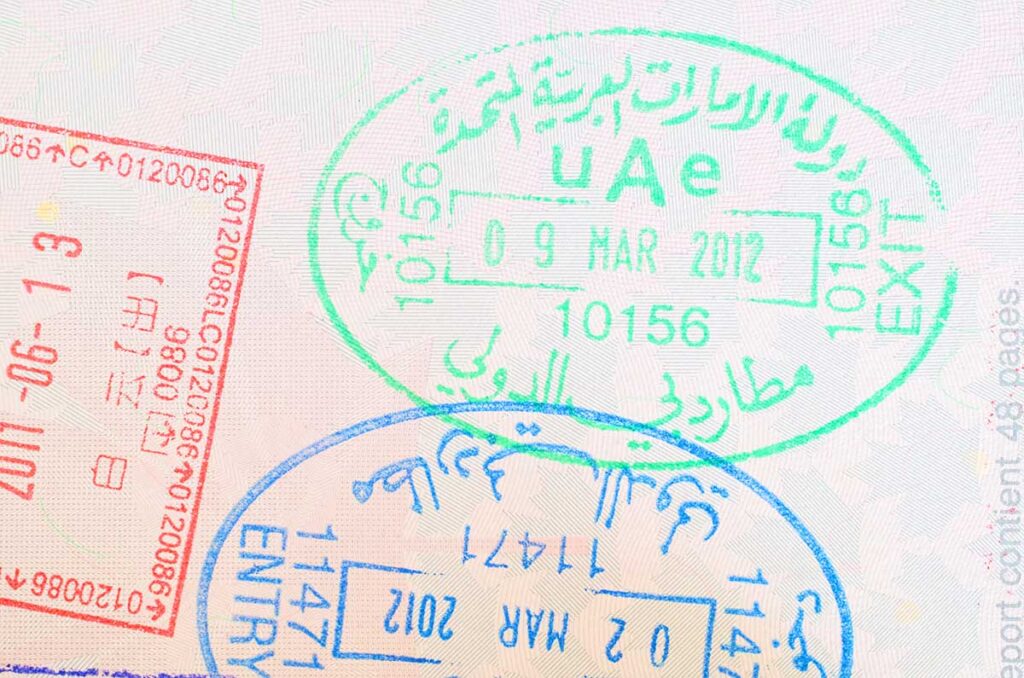
If you plan on living in Dubai or the United Arab Emirates after buying a property there, you should keep in mind that buying property alone does not grant you citizenship. Buying a property opens the option for you to apply for a long-term residency visa, allowing you to live and work in Dubai. Here are some of the most common long-term residency visas that you may qualify for as a Dubai property owner:
1. Golden Visa (10-year, renewable)
You can apply for and obtain a UAE Golden Visa through the DLD if your property purchase value is at least AED 2,000,000 (approximately $ 545,000 USD). Mortgaged properties can qualify if your paid-up amount meets the threshold; family sponsorship is allowed. Check DLD’s Golden Visa e-service for the current proofs required.
2. Investor Residence (Taskeen 2-year visa)
Property owners who purchase land or property with a value of AED 750,000 or more can apply for a renewable 2-year Taskeen long-term residence permit through the DLD.
3. Golden Visa (Retiree Visa)
Property owners with a property value of AED 1,000,000 or more and who are 55 years or older may qualify for a 5-year retiree visa.
DRUS Pro Tip: Ownership doesn’t auto-grant residency. You must apply through the relevant visa channel and meet the criteria listed above. Property ownership does, however, make you eligible to apply for and obtain long-term residency visas.
Renting your property: long-term (Ejari) vs. short-term (holiday home)
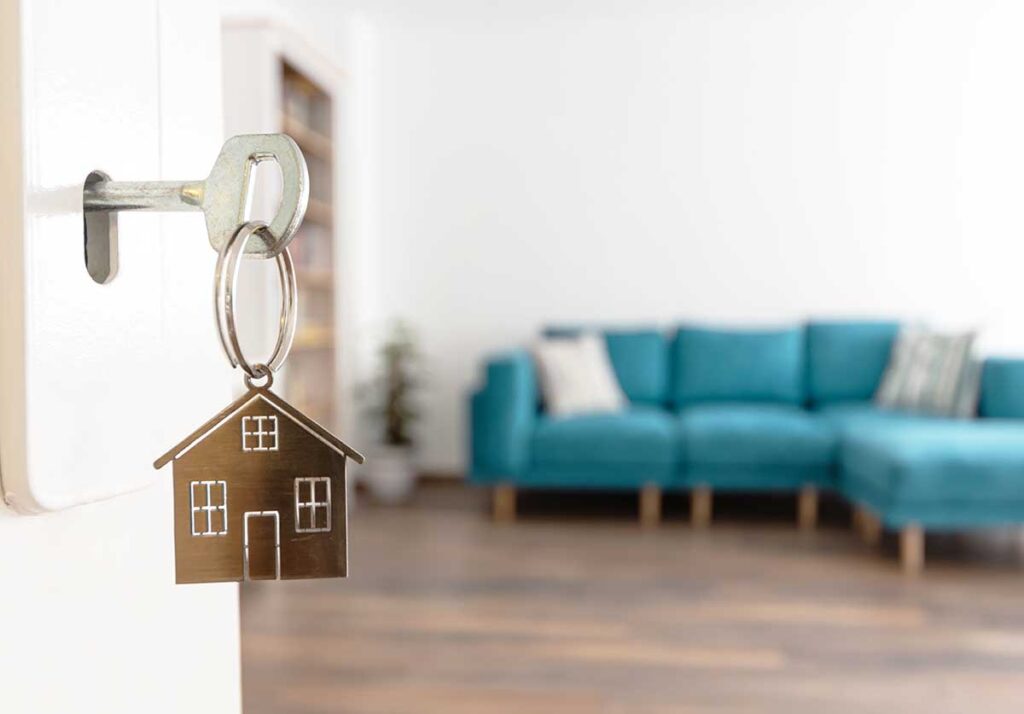
Long-term rentals (Ejari):
Dubai requires tenancy contracts to be registered in Ejari (through DLD/Dubai REST). Ejari serves as official evidence for utilities and dispute resolution. If you plan to rent out your property, ensure that your property manager handles Ejari registrations and renewals accurately.
Rent caps & renewals:
Dubai utilizes a Rent Calculator to determine the legal rent increase at renewal. Depending on how your current rent compares to the area’s average, the allowable increase ranges from 0% to 20% (with specific brackets), and landlords must respect notice periods. You can check the official rental calculator on the DLD website.
Short-term rentals (Airbnb-style holiday homes):
Property investors who want to rent their properties short-term must obtain a Holiday Home permit from Dubai’s Department of Economy & Tourism (DET) before listing their property on short-term rental apps and sites like Airbnb. The official DET page walks owners through logging into the portal, adding the unit, submitting supporting docs, and paying the fee.
DRUS Pro Tip: “My HOA says no short-term lets.”
Many buildings in Dubai restrict holiday homes (short-term Airbnb-style rentals). Check your community rules and title deed notes before assuming you can conduct short-term rentals, even if the DET permits them citywide.
Financing vs. cash when buying property in Dubai as a foreigner.
When buying property in Dubai as a foreigner, one of the first questions is whether to purchase with financing or pay cash. Both options offer unique advantages, and understanding them is crucial to making the right choice.
Cash buyers often enjoy faster transactions, stronger negotiation power, and the ability to secure properties in high-demand areas offering strong rental yields and world-class amenities.
For foreign nationals seeking flexibility, financing through local banks is available; however, eligibility may depend on factors such as income, credit history, and the type of property being purchased.
Another popular option for Americans may be exploring developer payment plans, which allow buyers to spread payments over time, sometimes even after handover, making it easier to access high rental yield properties without committing all capital upfront.
Developer payment plans are great for Americans and other international buyers seeking long-term growth while balancing cash flow.
Whether you choose financing, cash, or a developer-backed plan, DRUS helps you evaluate the right path so you can secure the best investment in Dubai’s most desirable communities.
Example: buying a ready apartment via financing.
- Price: AED 1,800,000
- LTV (bank offers 60% to a non-resident): Loan AED 1,080,000; down payment AED 720,000
- DLD transfer fee (4%): AED 72,000
- DLD admin/registration/title fees: ~AED 4,580 (range; confirm exacts)
- Trustee office: ~AED 2,000–4,000
- Agency: 2% = AED 36,000
- Mortgage registration: 0.25% of loan + AED 290 ≈ AED 3,000 + 290
- Valuation (bank): ~AED 2,500–3,500 (varies)
Upfront cash beyond down payment: roughly AED 120k–125k in this scenario (ranges vary—always confirm exact fees at the time using DLD’s portals).
Ready vs. off-plan properties: which is right for you?
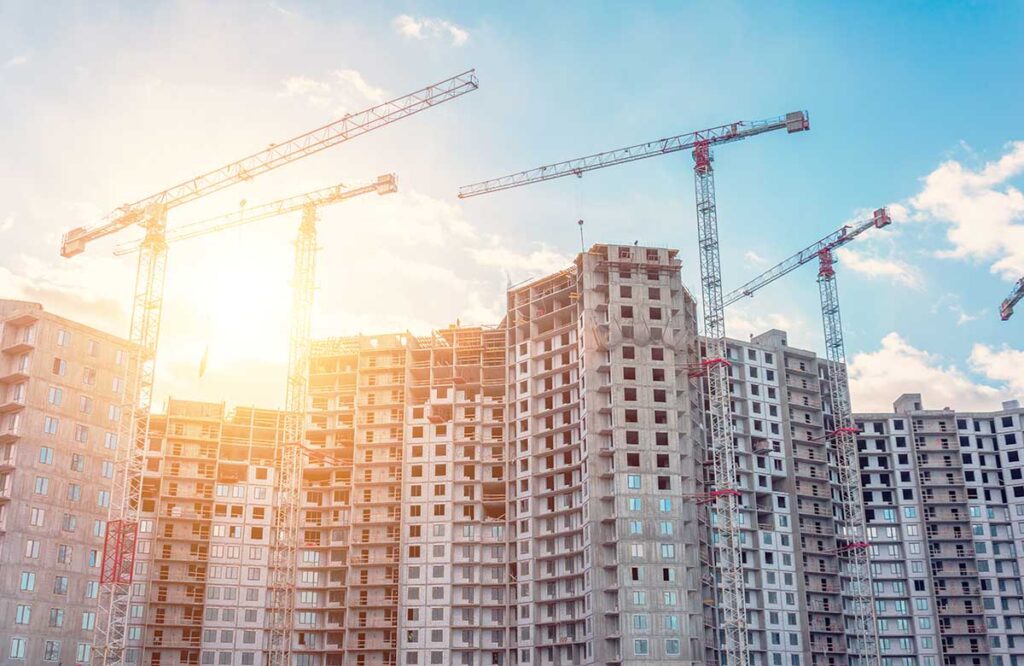
Ready (completed) property
- Immediate rental income potential after handover.
- Known community and service charges; you can see the exact unit you’re buying.
- Taxes/fees are the same general framework as off-plan, but you skip the multi-year construction risk.
Off-plan (under construction)
- Lower entry price or staged payment plans with reputable developers.
- Escrow protection and Oqood registration; transfers to full title at completion of your unit.
- Risks include construction delays, design changes, and developer performance. Check the project status on DLD, scrutinize the SPA, and ensure payments are made within the escrow channel.
DRUS Pro Tip: If you want to invest in short-term rentals, confirm with your property developer that your building will permit holiday homes before you buy a unit. This is especially important if you’re buying an off-plan Dubai property. A glossy brochure is not the same as building bylaws, which may limit or prohibit short-term rentals.
What to expect if you’re planning on renting out your property.
Long-term lets.
- Typical rental contracts in Dubai are 1 year in duration, paid in 1–4 installments.
- Renewal increases must comply with the RERA Rental Index rules; use the DLD calculator to determine if any increase is legally permitted.
- You must register the tenancy in Ejari.
Short-term rentals (holiday homes).
- You must apply for and obtain a DET Holiday Home permit. To do so, you will need to provide ownership documents, DEWA details, and evidence of compliance with classification and guest standards.
- Factor in property management into your rental yield. This includes services such as cleaning, guest support, key exchange, linen service, and platform fees, which can add up.
Keep in mind the municipality fee & service charges.
- Model the 5% Housing Fee on your property’s rental value (owner-occupiers and tenants both see it on DEWA), plus your building’s service charges and district cooling, if any.
U.S. tax filing.
- Maintain immaculate records and a dedicated UAE bank account for rental purposes. Report income on your U.S. return if you need to; discuss depreciation, travel, and management fees with your CPA.
Inheritance & estate planning for Americans
By default, the UAE applies local inheritance rules. Non-Muslims and Americans can register DIFC Wills to cover Dubai assets (like your property), so that your property is distributed according to your wishes upon your passing away. The DIFC Wills Service Centre publishes the requirements and process. If your property is held in joint names or a special-purpose company, consult local counsel to ensure titling aligns with your U.S. estate plan.
DRUS Pro Tip: Don’t leave inheritance as an afterthought. Registering a DIFC Will (or otherwise planning ownership) prevents expensive, time-consuming uncertainty for your heirs. It ensures that your property is distributed according to your wishes, rather than Dubai’s local laws.
Setting up utilities after you buy a Dubai property.
Utilities (DEWA): After foreigners buy property, they must set up utilities through DEWA. This is done by providing them with your title deed and paying small activation/deposit fees. Activation is generally quick after documents are accepted.
District cooling: Many towers utilize providers such as Empower/Emicool. Expect separate security deposits and monthly bills; please ask your broker/building management for the correct contact information.
Property management: If you won’t live in Dubai, hire a RERA-licensed property manager with clear SLAs (tenant screening, rent collection, maintenance approvals, vacancy marketing, Ejari handling, and financial reporting).
Insurance: Buy homeowners/landlord insurance (building coverage may extend to common areas; you insure your unit’s contents and liability).
How much money should you put down to buy a Dubai property?
For foreign nationals and Americans purchasing property in Dubai, the standard down payment is typically set at 20% for homes valued up to AED 5 million (~USD 1.36 million) and 30–35% for properties exceeding that amount.
In addition to the down payment, expect to pay 6–8% in upfront fees, which include Dubai Land Department registration, agent commission, and mortgage processing.
For ready properties, banks typically require the full down payment up front. Off-plan properties, however, offer flexibility, with some developers allowing as little as 10% at booking, followed by staged installments during construction, and even post-handover plans that spread costs over several years.
These options make entering Dubai’s property market easier while balancing cash flow. At DRUS, we collaborate with leading developers and agents to guide Americans through financing, fees, and payment plans, enabling them to secure high-yield investments in Dubai’s best areas confidently.
Common mistakes U.S. buyers make and how to avoid them.
- Underestimating fees (transfer, registration, trustee, NOC, mortgage registration, valuation, agency). Build them into your offer math to avoid surprises.
- Skipping escrow verification in off-plan deals. Always pay into the project escrow; verify that the project and developer are properly licensed with DLD.
- Assuming short-term letting is automatic. Holiday homes require a DET permit and building consent; not all HOAs permit it.
- Ignoring rent caps on renewals. Use the DLD Rental Calculator to ensure your income model reflects the legal ceilings.
- Not planning inheritance. Register a DIFC Will (if applicable) or establish a holding structure with the guidance of local legal counsel.
- Confusing “no tax” with “no reporting.” You may owe U.S. tax on rental income and have FBAR/FATCA reporting obligations.
- Over-leveraging as a non-resident. Bank practice often caps you below regulatory maxima, so secure pre-approval before negotiating hard deadlines.
Frequently asked questions by US buyers.
1. What is the average property price in Dubai for foreigners?
The average property price in Dubai varies by community, but U.S. buyers can expect apartments in popular areas, such as Downtown and Dubai Marina, to start around $300,000. Meanwhile, villas in specific areas, like Dubai Hills or the Palm Jumeirah, can range well above $1 million. Prices remain competitive compared to major U.S. cities.
2. Do I need to pay income tax or capital gains tax on my Dubai property?
Dubai does not levy income tax on rental income or capital gains tax when assets are sold, making it an attractive market for American investors. However, you may still need to report income in the U.S, so it’s wise to consult your CPA for proper filing.
3. What are the required documents to buy property as an American?
Americans only need a valid passport to begin, along with proof of funds or mortgage pre-approval. If financing is required, banks may request income verification. Property lawyers can help review contracts, ensure compliance, and guide you through the Dubai Land Department’s registration process.
4. How do I make sure I’m the legal owner after purchase?
Ownership in Dubai is straightforward. Once the transaction is complete and fees are paid, the Dubai Land Department issues a title deed in your name, making you the legal owner of the property. You can check DLD property records to ensure that you are indeed the registered owner of the property.
5. How do I choose the right real estate agent in Dubai?
Working with the right real estate agent is crucial for Americans navigating property prices, zoning regulations, and community rules. At DRUS, we partner with trusted Dubai brokers who understand both the U.S and UAE markets, ensuring you buy in prime locations while avoiding common pitfalls.
6. Do I need a UAE company to buy Dubai property?
No, you do not need to set up a UAE company to buy property in Dubai. In fact, individuals can own property in all freehold areas of Dubai. Some investors use UAE SPVs (e.g., for estate planning or joint ventures), but that’s optional and requires bespoke legal and tax advice.
7. Can Americans buy a property anywhere within the UAE?
Americans cannot purchase property anywhere in the UAE, but they can buy freely in designated areas approved for foreign ownership, primarily in Dubai and Abu Dhabi. These zones include freehold communities where you can own apartments, villas, or even hotel apartments outright. The UAE designed this system to attract global investors while keeping restrictions in non-designated zones.
8. How fast can I close on a property?
Cash deals can close in days once the NOC is ready and the trustee appointments are in place. Mortgages add valuation and underwriting time, so plan for weeks rather than days, especially if you are a non-resident.
9. Are prices or payments in AED or USD?
Payments are usually made in AED. The AED is pegged to the USD at around 3.6725, making modeling straightforward for Americans.
10. Can property ownership get me residency?
Ownership can qualify you for an Investor Visa (2-year, with a minimum investment of AED 750,000) or Golden Visa (10-year, with a minimum investment of AED 2 million), subject to meeting the criteria and applying through the DLD portals. Long-term residency is not automatic; you’ll have to apply for long-term residency after buying your property.
11. What about “property tax”?
Dubai doesn’t levy a U.S style property tax, but you’ll see the 5% Housing Fee, which is 5% of the annual rental value of your property on DEWA bills plus community service charges.
12. Can I Airbnb my unit?
You can short-term rent out your unit only if your building allows it and you successfully obtain a DET Holiday Home permit from the Dubai government.
13. How do rent increases work?
You can only raise rents at the renewal period, and the amount must be within RERA’s brackets based on the Rental Index (0–20% depending on how far below the index your current rent is). Use the DLD calculator to figure out how much you can raise your rent.

